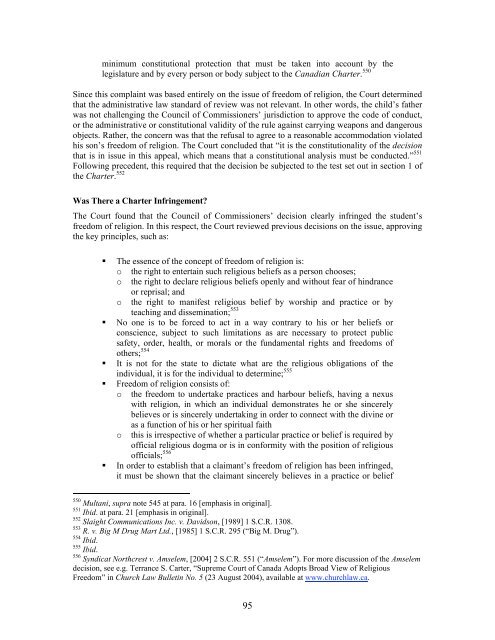Volume IV, Issue II (April 2006) - Columbus School of Law
Volume IV, Issue II (April 2006) - Columbus School of Law
Volume IV, Issue II (April 2006) - Columbus School of Law
Create successful ePaper yourself
Turn your PDF publications into a flip-book with our unique Google optimized e-Paper software.
minimum constitutional protection that must be taken into account by thelegislature and by every person or body subject to the Canadian Charter. 550Since this complaint was based entirely on the issue <strong>of</strong> freedom <strong>of</strong> religion, the Court determinedthat the administrative law standard <strong>of</strong> review was not relevant. In other words, the child’s fatherwas not challenging the Council <strong>of</strong> Commissioners’ jurisdiction to approve the code <strong>of</strong> conduct,or the administrative or constitutional validity <strong>of</strong> the rule against carrying weapons and dangerousobjects. Rather, the concern was that the refusal to agree to a reasonable accommodation violatedhis son’s freedom <strong>of</strong> religion. The Court concluded that “it is the constitutionality <strong>of</strong> the decisionthat is in issue in this appeal, which means that a constitutional analysis must be conducted.” 551Following precedent, this required that the decision be subjected to the test set out in section 1 <strong>of</strong>the Charter. 552Was There a Charter Infringement?The Court found that the Council <strong>of</strong> Commissioners’ decision clearly infringed the student’sfreedom <strong>of</strong> religion. In this respect, the Court reviewed previous decisions on the issue, approvingthe key principles, such as:The essence <strong>of</strong> the concept <strong>of</strong> freedom <strong>of</strong> religion is:o the right to entertain such religious beliefs as a person chooses;o the right to declare religious beliefs openly and without fear <strong>of</strong> hindranceor reprisal; ando the right to manifest religious belief by worship and practice or byteaching and dissemination; 553No one is to be forced to act in a way contrary to his or her beliefs orconscience, subject to such limitations as are necessary to protect publicsafety, order, health, or morals or the fundamental rights and freedoms <strong>of</strong>others; 554It is not for the state to dictate what are the religious obligations <strong>of</strong> theindividual, it is for the individual to determine; 555Freedom <strong>of</strong> religion consists <strong>of</strong>:o the freedom to undertake practices and harbour beliefs, having a nexuswith religion, in which an individual demonstrates he or she sincerelybelieves or is sincerely undertaking in order to connect with the divine oras a function <strong>of</strong> his or her spiritual faitho this is irrespective <strong>of</strong> whether a particular practice or belief is required by<strong>of</strong>ficial religious dogma or is in conformity with the position <strong>of</strong> religious<strong>of</strong>ficials; 556In order to establish that a claimant’s freedom <strong>of</strong> religion has been infringed,it must be shown that the claimant sincerely believes in a practice or belief550 Multani, supra note 545 at para. 16 [emphasis in original].551 Ibid. at para. 21 [emphasis in original].552 Slaight Communications Inc. v. Davidson, [1989] 1 S.C.R. 1308.553 R. v. Big M Drug Mart Ltd., [1985] 1 S.C.R. 295 (“Big M. Drug”).554 Ibid.555 Ibid.556 Syndicat Northcrest v. Amselem, [2004] 2 S.C.R. 551 (“Amselem”). For more discussion <strong>of</strong> the Amselemdecision, see e.g. Terrance S. Carter, “Supreme Court <strong>of</strong> Canada Adopts Broad View <strong>of</strong> ReligiousFreedom” in Church <strong>Law</strong> Bulletin No. 5 (23 August 2004), available at www.churchlaw.ca.95
















